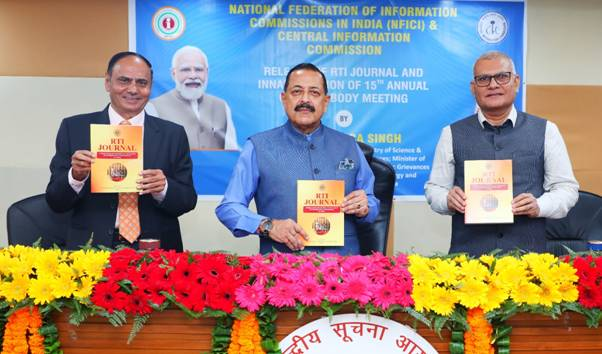Jitendra Singh Launches RTI E-Journal, Highlights Reforms for Transparency
In his inaugural address, Dr. Jitendra Singh outlined some of the landmark Department of Personnel & Training (DoPT) reforms introduced over the past decade.

- Country:
- India
Union Minister of State (Independent Charge) for Science & Technology, Earth Sciences, Personnel, Public Grievances and Pensions, Space and Atomic Energy, Dr. Jitendra Singh, released the latest edition of the RTI Journal and launched an E-Journal on the website of the National Federation of Information Commissions in India (NFICI) during the 15th Annual General Body Meeting of NFICI at the Central Information Commission (CIC), New Delhi.
The event was attended by Chief Information Commissioner Heeralal Samariya, as well as State Chief Information Commissioners and Information Commissioners from across the country, reflecting the importance of coordinated efforts in strengthening India’s Right to Information (RTI) framework.
Transformative Reforms Since 2014
In his inaugural address, Dr. Jitendra Singh outlined some of the landmark Department of Personnel & Training (DoPT) reforms introduced over the past decade. He recalled the abolition of more than 1,600 obsolete rules, beginning with the elimination of the requirement for documents to be attested by gazetted officers.
“This reform sent out a powerful message – that the Government trusts the youth of India, who constitute 70% of the population,” he said.
Another major reform was the abolition of interviews for government recruitment, a decision that removed subjectivity, favoritism, and nepotism from the selection process. Despite initial skepticism, this move has since enhanced public trust, transparency, and objectivity in governance.
Transparency and Citizen-Centric Governance
Dr. Singh highlighted how, under Prime Minister Narendra Modi’s principle of “Maximum Governance, Minimum Government”, transparency and accountability have been placed at the core of governance.
He praised the CIC and State Commissions for maintaining near 100% disposal of RTI cases, even during the COVID-19 pandemic, when sittings were conducted through digital platforms to ensure uninterrupted functioning. “This speaks volumes of how technology-driven options are being used effectively to strengthen transparency,” he noted.
The Minister also referred to innovative practices like the ‘Human Desk’ initiative, under which RTI applicants receive personal counselling or feedback calls after disposal of their applications. “Disposal is important, but so is the citizen’s happiness index,” he emphasized, pointing out that these efforts make applicants feel acknowledged and engaged.
Streamlining RTI Processes
With many government orders and policy decisions now proactively published on official websites, Dr. Singh observed that repetitive RTI applications have declined. He recommended stronger mechanisms to filter avoidable queries and suggested streamlined Standard Operating Procedures (SOPs) for faster and more efficient redressal.
Role of NFICI and Information Commissions
Dr. Singh appreciated NFICI for becoming an effective platform for coordination, knowledge sharing, and best practices among Information Commissions nationwide. He urged Information Commissioners to proactively share suggestions and insights during their tenure so that they can be implemented in real time.
“RTI and Information Commissions are not just legal mechanisms, they are pillars of democratic accountability,” he said. He underlined that with tools like CPGRAMS (Centralised Public Grievance Redress and Monitoring System) and digital innovations, India is steadily moving towards a governance system that is transparent, responsive, and citizen-centric.
The launch of the RTI E-Journal and the deliberations at the NFICI meeting reaffirm the government’s commitment to institutional transparency, efficiency, and public participation in governance. Dr. Jitendra Singh’s emphasis on reforms, innovation, and trust in citizens underscores the evolving vision of RTI – not just as a legal right but as a foundation for good governance in 21st-century India.










